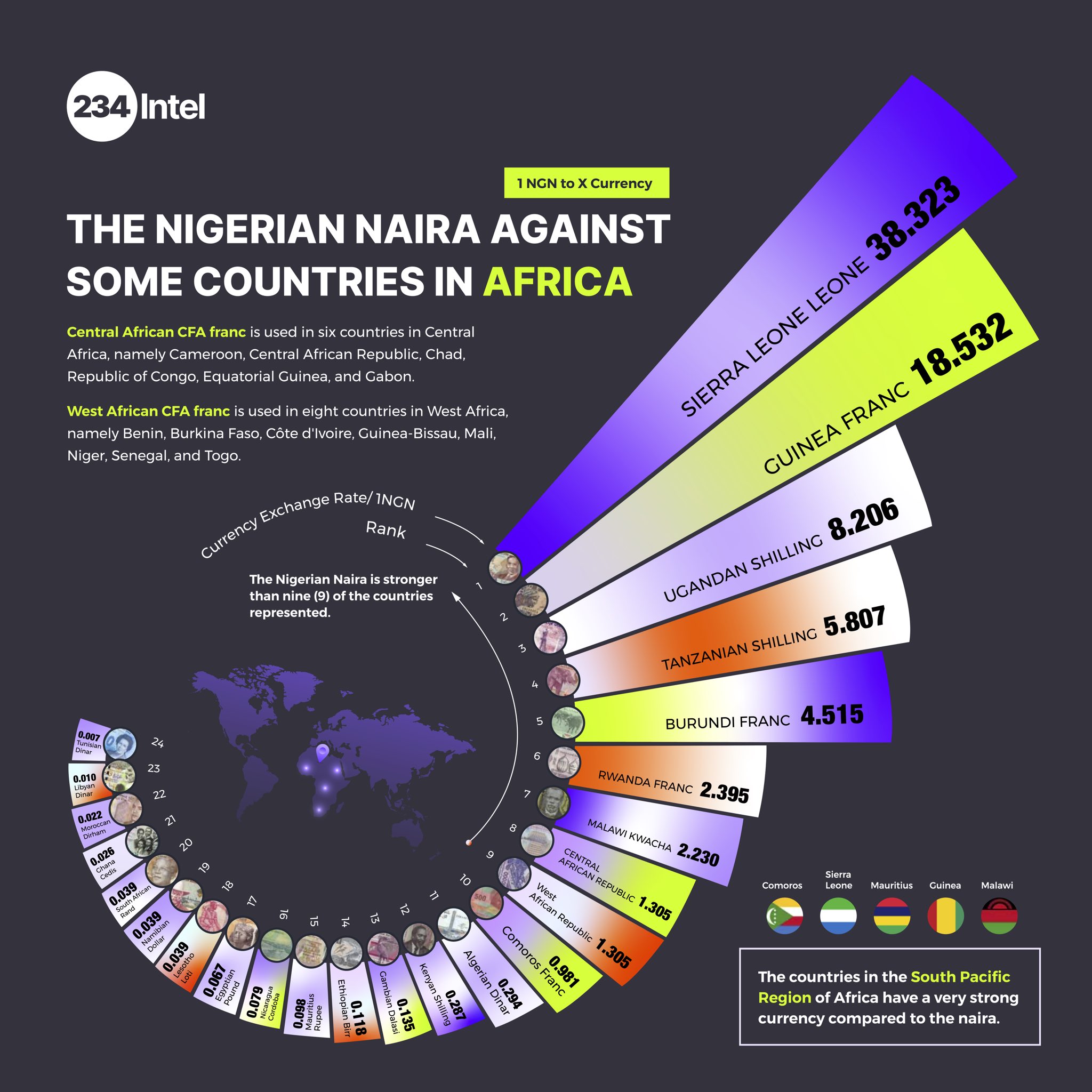The official currency of Nigeria, the continent of Africa’s largest economy, is the Nigerian Naira (NGN). The Nigerian Naira is one of the most commonly utilised currencies in Africa, hence its value relative to other African currencies has a big impact on regional commerce, investment, and economic stability. This post will look at the Nigerian Naira’s relative strength and current exchange rates against some of the major African currencies.
The economic situation, political stability, availability of foreign exchange reserves, and dynamics of the world market are only a few of the variables that affect the Nigerian Naira and its exchange rates with other African currencies. In comparison to the Nigerian Naira, let’s take a deeper look at some of the African nations and their respective currencies:
1. South African Rand (ZAR): The South African Rand is the currency of South Africa, the continent’s second-largest economy. The Nigerian Naira has historically been weaker than the South African Rand. 25.39 Nigerian Naira equal to 1 South African Rand as at today’s CBN exchange rate , suggesting that the Naira is weaker than the Rand.
2. Ghanaian Cedi (GHS): The Ghanaian Cedi is the currency of Ghana, a West African country recognized for its robust economy. The Ghanaian Cedi and the Nigerian Naira exchange rate have fluctuated throughout time. According to the CBN exchange rate of today, 38.20 Nigerian Naira is equivalent to 1 Ghanaian Cedi, indicating that the Naira is weaker than the Cedi in exchange value.
3. Kenyan Shilling (KES): Kenya, an East African nation with a developing economy, uses the Kenyan Shilling as its official currency. The Nigerian Naira has historically been less strong than the Kenyan Shilling. One Nigerian Naira is roughly equal to 0.040 Kenyan Shilling at the current exchange rate, showing that the Naira is weaker than the Shilling.
4. Egyptian Pound (EGP): One of the major economies in North Africa, Egypt uses the Egyptian Pound as its official currency. The Nigerian Naira has historically been less strong than the Egyptian Pound. According to the current exchange rate, 14.88 Nigerian Naira is roughly equal to 1 Egyptian Pound, showing that the Naira is less valuable than the Pound in exchange.
5. Moroccan Dirham (MAD): Morocco is a nation in North Africa with a diverse economy. Its currency is the Moroccan Dirham (MAD). The Nigerian Naira has historically been less strong than the dirham of Morocco. One Nigerian Naira is roughly equal to 0.088 Moroccan Dirham at the current exchange rate , showing that the Naira is weaker than the Dirham.
6. Tunisian Dinar (TND): The Tunisian Dinar has recently stayed very stable versus the Nigerian Naira, with just small movements. It is important to note, however, that Tunisia’s historically low inflation rate has helped to the TND’s climb to the top of the African currency rankings over the years. It saw less volatility than Egypt and Morocco, two neighbouring oil-based economies, between 2000 and 2010.
To cement its position as Africa’s most valued currency, the Tunisian government made it illegal to import, export, or exchange dinars into other currencies. The exchange rate between the Tunisian Dinar (TND) and the Nigerian Naira (NGN) as of today’s exchange rate is 1 TND = 148.27 NGN.
It’s crucial to remember that exchange rates can change over time as a result of a variety of variables, such as market forces, monetary policies, and world events. A complex combination of domestic and foreign factors affects how strong the Nigerian Naira is compared to other African currencies. Furthermore, the source or market where the conversion is being conducted may affect the exchange rate.
THE AFRICAN FRANCS
The Central African Franc (XAF) is the official currency of Cameroon, the Central African Republic, Chad, the Republic of Congo, Equatorial Guinea, and Gabon. The West Africa Franc (XOF) is used in eight West African countries: Benin, Burkina Faso, Cote d’Ivoire, Guinea-Bissau, Mali, Niger, Senegal, and Togo. These currencies are members of the Central African Economic and Monetary Community (CEMAC) and the West African Economic and Monetary Union (WAEMU), two regional organisation that promote economic integration and cooperation among member countries.
The Central African Franc (XAF) and West African Franc (XOF) have fluctuated in value against the Nigerian Naira (NGN) in recent years. Despite the Naira’s relative stability against these currencies, there have been times of volatility brought on by a variety of causes, such as shifts in the price of oil, a crucial export for Nigeria, and regional macroeconomic difficulties.
Currently, the XAF and the XOF have the same exchange value against the Naira. 1 Naira is equivalent to 1.30 XAF/XOF.
Below is an infographic representation of the Naira exchange value against some African currencies.
I enjoyed reading your piece and it provided me with a lot of value.
Thank you for your help and this post. It’s been great.